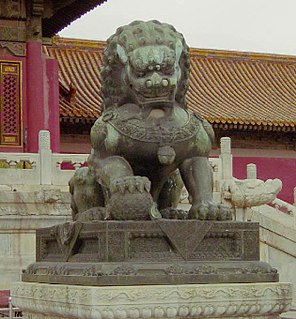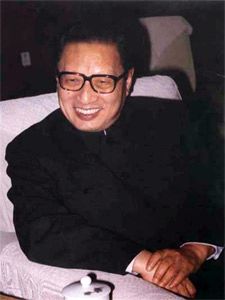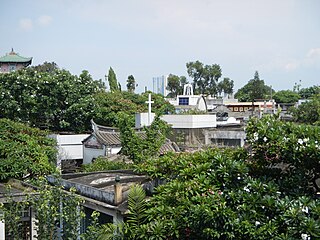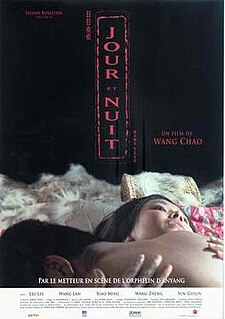
Qin Shi Huang was the founder of the Qin dynasty and was the first emperor of a unified China. He was born Ying Zheng (嬴政) or Zhao Zheng (趙政), a prince of the state of Qin. He became Zheng, the King of Qin (秦王政) when he was thirteen, then China's first emperor when he was 38 after the Qin had conquered all of the other Warring States and unified all of China in 221 BC. Rather than maintain the title of "king" borne by the previous Shang and Zhou rulers, he ruled as the First Emperor (始皇帝) of the Qin dynasty from 220 to 210 BC. His self-invented title "emperor", as indicated by his use of the word "First", would continue to be borne by Chinese rulers for the next two millennia.

Chinese or Imperial guardian lions, also known as lion dogs or foo dogs in English, are a traditional Chinese architectural ornament. Typically made of stone, they are also known as stone lions or shishi. The concept, which originated and became popular in Chinese Buddhism, features a pair of highly stylized lions—often one male with a ball and one female with a cub—which were thought to protect the building from harmful spiritual influences. Used in imperial Chinese palaces and tombs, the lions subsequently spread to other parts of Asia including Japan, Korea, Tibet, Thailand, Burma, Vietnam, Sri Lanka, Nepal, Cambodia, Laos, and Singapore.
Shi Tao is a mainland Chinese journalist, writer and poet, who in 2005 was sentenced to imprisonment for 10 years for releasing a document of the Communist Party to an overseas Chinese democracy site.

The Later Jìn, also called Shi Jin (石晉), was one of the Five Dynasties during the Five Dynasties and Ten Kingdoms period in China. It was founded by Shi Jingtang, who was posthumously titled "Gaozu". Liao, its original protector state, destroyed Later Jin by invading in 946 and 947, after Jin's second ruler, Shi Chonggui, fell out with them.
Han Guangsheng (韩广生), emerged as a Chinese defector in Canada during July, 2005 to support a number of allegations made by Chen Yonglin. Han claims to have been in charge of Shenyang's public security and labor camps prior to his defection.

Qiao Shi was a Chinese politician and one of the top leaders of the Communist Party of China. He was a member of the party's top decision-making body, the Politburo Standing Committee, from 1987 to 1997. He was a contender for the paramount leadership of China, but lost out to his political rival Jiang Zemin, who assumed the post of General Secretary of the party in 1989. Qiao Shi instead served as Chairman of the National People's Congress, then the third-ranked political position, from 1993 until his retirement in 1998. Compared with his peers, including Jiang Zemin, Qiao Shi adopted a more liberal stance in political and economic policy, promoting the rule of law and market-oriented reform of state-owned enterprises.

The Manila Chinese Cemetery (華僑義山) is the second oldest cemetery in Manila after La Loma Cemetery and was designated as the resting place for the Chinese who were denied burial in Catholic cemeteries during the Spanish colonial period. The cemetery was witness to many executions during World War II. Among them were Girl Scouts organizer Josefa Llanes Escoda, Filipino Brigadier General and hero during World War II and Boy Scouts of the Philippines charter member Vicente Lim, literary geniuses Rafael Roces and Manuel Arguilla, star athlete-turned-guerrilla spy Virgilio Lobregat, and Chinese Consul General Yang Guangsheng. Apolinario Mabini was also buried in the cemetery before his remains were transferred to Batangas.
Shi Liang was a prominent lawyer and activist of the Republic of China. She was the only woman arrested in what was known as the Seven Gentlemen Incident on the eve of war with Japan in 1936. In 1949, she became the Minister of Justice of the People's Republic of China.
Wang Shi-Ting is a retired professional tennis player from Taiwan. Wang turned pro in 1991. During her career, she won 6 singles on the WTA Tour. She played 49 times over 11 years for Chinese Taipei Fed Cup team, earning a 51–25 overall record and setting many team records. She retired from the tour in 2000. Wang is currently the captain of the Chinese Taipei Fed Cup team.

Day and Night is a 2004 Chinese film, and the second film by Sixth Generation writer-director Wang Chao. It is also known, less accurately, as Night and Day. The film constitutes the second entry in Wang Chao's loose trilogy on modern China. It was preceded by Wang's 2001 debut, The Orphan of Anyang, and would be followed by Luxury Car in 2006. The film is a Chinese-French co-production between Fang Li's Laurel Films and Sylvain Busztejn's Rosem Pictures in association with the China Film Fourth Group and Arte France Cinema; Laurel and Rosem would later reunite to produce Luxury Car.
Shi Yafeng was an academician of the Chinese Academy of Sciences. He was an expert on geography and glaciology, and regarded as the "Father of Chinese Glaciology".
Shi Zhongci, also known as Zhong-Ci Shi, is a computational mathematician of the People's Republic of China, and an academician of Chinese Academy of Sciences (CAS).
Li Daoyuan was a Chinese geographer, writer, and politician during the Northern Wei Dynasty. He is known as the author of the Commentary on the Water Classic (Shuijingzhu), a monumental work on China's geography in ancient times.

The Water Margin is a 1998 Chinese television series adapted from Shi Nai'an's classical novel of the same title. It was produced by CCTV with Zhang Jizhong as producer. It was first broadcast in China in January 1998. The series also featured action choreography by Yuen Woo-ping.
The Guangsheng Temple (广胜寺) is a Buddhist temple, located at the southern foot of Mt. Huoshan, 17 km northeast of Hongtong County, Shanxi, China. The temple was built in 147 and was changed to its present name in the Tang Dynasty. It has three parts: the upper temple, the lower temple and the Shuishen Temple. The world-renowned drama murals from the Yuan dynasty are kept in the lower temple.
Bai Mudan, also romanized as Pai Mu-tan, is a character from Chinese mythology. She is described as the most beautiful courtesan in the city of Luoyang and a reincarnation of Peony fairy.

The Zhaocheng Jin Tripitaka is a Chinese copy of the Buddhist canon dating from the Jin dynasty (1115–1234).
Nuoxi Yao, or Nuoxihua 那溪话, is a Kam–Sui language of Nuoxi Township 那溪瑶族乡, Dongkou County, Hunan Province, China. Even though they are classified as ethnic Yao people by the Chinese government, the Nuoxi Yao speak a Kam–Sui language closely related to Dong. Shi (2015:132) considers Nuoxi Yao to have split off from Dong about 600 years.
Juliana Young Koo was a Chinese and American diplomat who worked in the UN Protocol Department. Her first husband, Chinese diplomat Yang Guangsheng was executed by the Japanese during World War II. After the war, she moved to the United States and married the diplomat and politician Wellington Koo. She was a supercentenarian.

Paradise of Bhaisajyaguru (薬師佛) or Pure Land of Bhaisajyaguru is a painting during China’s Yuan Dynasty. This painting was originally housed in Guangsheng Lower Monastery, Zhaocheng County, Shanxi. The painting, which was at the eastern gable wall of the Main Hall of the monastery, was purchased by Arthur M. Sackler and later was given to Metropolitan Museum of Art, New York, United States in 1954.










